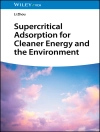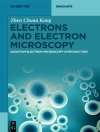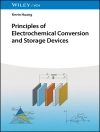>Collagen-Derived Materials
Comprehensive Resource for Current Ideas and Strategies for the Synthesis and Characterization of Advanced Collagen-Derived Materials
This book presents and summarizes new synthetic strategies and multi-functional applications of collagen-derived materials in electrochemical energy storage and conversion. Through easily-comprehensible illustrations and images, the book presents basic knowledge for collagen-derived materials (including gelatin and collagen-derived carbons) and their typical synthesis and applications, thus enabling students and new researchers to obtain a thorough understanding of different materials and corresponding application areas.
This book also serves as an important reference book for scientists and engineers in different research fields. It presents the up-to-date ideas and strategies for the synthesis and characterization of advanced collagen-derived materials, as well as multi-functional applications (especially in energy-related areas). Sample topics covered within the book include:
- Structural compositions, properties, and extraction of collagen and gelatin
- Precursors, structural compositions, and synthesis of collagen-derived carbons
- Applications of collagen-derived materials in electrochemical energy storage and conversion
- Applications of collagen-derived materials as electrode and supporting materials in the electrochemical energy storage and conversion systems, including capacitors, batteries, and electrocatalysts
- Challenges and opportunities for the design and synthesis of different collagen-derived materials
For electrochemists, materials scientists, chemical engineers and students in related programs of study who are interested in the topic of collagen-derived materials, Collagen-Derived Materials: Synthesis and Applications in Electrochemical Energy Storage and Conversion serves as an important resource for gaining a holistic understanding of the field and learning about the state of the art based on promising energy-related applications.
Зміст
Preface ix
1 Introduction 1
1.1 Electrochemical Energy Storage and Conversion 1
1.1.1 Secondary Batteries and Supercapacitors 2
1.1.2 Fuel Cells and Electrolyzers 4
1.2 Materials for Electrochemical Energy Storage and Conversion 5
1.2.1 Materials for Lithium-Ion Batteries 5
1.2.2 Materials for Supercapacitors 6
1.2.3 Materials for Oxygen Electrochemistry 7
1.2.4 Biomass-Derived Materials for Electrochemical Energy Storage and
Conversion 7
1.3 Collagen-Derived Materials for Electrochemical Energy Storage and
Conversion 9
References 12
2 Collagen 15
2.1 History of Collagen 15
2.2 Structure and Composition of Collagen 16
2.2.1 Amino-Acid Residue and Triple-Helix Structure 17
2.2.2 Primary Structure of Chains 20
2.2.3 Molecular Organization and Structure 25
2.2.4 Aggregate Structure 28
2.3 Classification, Function, and Distribution of Collagen 31
References 33
3 Synthesis and Applications of Collagen 39
3.1 Biosynthesis of Collagen 39
3.1.1 Formation of Pro-α-Chains 39
3.1.2 Hydroxylation and Glycosylation 40
3.1.3 Assembly to Triple-Helix Structure 41
3.1.4 Cleavage of Procollagen Molecules 41
3.1.5 Formation of Collagen Fibrils 41
3.1.6 Cross-Linking to Collagen Fibers 43
3.2 Extraction of Collagen 43
3.2.1 Acid Method 43
3.2.2 Salt Method 44
3.2.3 Enzymatic Method 44
3.2.4 Posttreatment 45
3.3 Applications of Collagen 46
3.3.1 Clinical Applications of Collagen 46
3.3.2 Food Applications of Collagen 48
3.3.3 Cosmetics Applications of Collagen 49
References 51
4 Gelatin 55
4.1 History of Gelatin 55
4.2 Structures and Compositions 59
4.2.1 Molecular Structures 59
4.2.2 Amino Acids 62
4.3 Properties and Characterization 66
4.3.1 Viscosity and Adhesion 66
4.3.2 Amphoteric Behavior and Isoelectric Point 66
4.3.3 Surface Activity 67
4.3.4 Gel Formation and Strength 70
4.3.5 Rheology of Gelatin Solution 73
4.3.5.1 Amino-Acid Analysis 77
4.3.5.2 Determination of Total Protein Content 77
4.3.5.3 Electrophoretic Analysis 77
4.3.5.4 Viscoelastic Properties 77
4.3.5.5 Gel Strength 78
References 78
5 Synthesis of Gelatin 81
5.1 Raw Materials 81
5.2 Extraction 85
5.2.1 Alkali-Treated Method 87
5.2.2 Acid-Treatment Method 87
5.2.3 Salt-Fraction Method 90
5.2.4 Enzymatic Method 91
5.2.5 Heat–Pressure Method 93
5.2.6 Microwave- and Ultrasonication-Assisted Extraction Methods 93
5.2.7 Posttreatment 94
5.2.7.1 Filtration and Clarification 94
5.2.7.2 Deionization 95
5.2.7.3 Concentration 95
5.2.7.4 Final Sterilization 96
5.2.7.5 Drying Process for Granulated Gelatin 96
5.2.7.6 Normalization and Packaging of Granulated Gelatin 97
5.3 Modification 98
5.3.1 Physical Modification 98
5.3.1.1 Orientational Methods of Modification 98
5.3.1.2 Conformational Methods of Modification 98
5.3.2 Chemical Modification 100
5.3.2.1 Phosphorylation Modification 101
5.3.2.2 Aldehyde Modification 103
5.3.2.3 Polyphenols Modification 104
5.3.2.4 Succinylation Modification 104
5.3.3 Enzymatic Modification of Gelatin 105
5.3.4 Complex Modification of Gelatin 106
References 107
6 Applications of Gelatin in Electrochemical Energy Storage and Conversion 111
6.1 As Binders for Battery Electrodes 111
6.1.1 As Binders of Electrodes for Lithium–Sulfur Batteries 111
6.1.2 As Binders of Electrodes for Lithium-Ion Batteries 113
6.2 As Modifying Agents for Battery Electrodes 116
6.2.1 As Modifying Agents of Electrodes for Lithium–Sulfur Batteries 116
6.2.2 As Modifying Agents of Electrodes for Lithium Batteries 119
6.3 As Modifying Agents for Battery Separators 121
6.3.1 As Modifying Agents of Separators for Lithium–Sulfur Batteries 121
6.3.2 As Modifying Agents of Separators for Other Batteries 123
6.4 As Electrodeposition Additives for Electrode Preparation 125
6.5 As Hydrogel Electrolytes for Batteries 128
6.6 Other Applications in Electrochemical Energy and Conversion 136
References 139
7 Collagen-Derived Carbons 143
7.1 History of Collagen-Derived Carbons 143
7.2 Carbonization Mechanism of Collagen-Derived Carbons 143
7.3 Structures and Compositions of Collagen-Derived Carbons 147
7.3.1 Morphologies 147
7.3.1.1 Zero-Dimensional Carbon Materials 147
7.3.1.2 One-Dimensional Carbon Materials 151
7.3.1.3 Two-Dimensional Carbon Material 153
7.3.1.4 Three-Dimensional Carbon Materials 157
7.3.2 Porosities 160
7.3.3 Heteroatoms and Defects 171
7.3.3.1 Types and Functions of Defects 171
7.3.3.2 Types and Functions of Heteroatoms 172
7.3.3.3 Collagen-Derived Carbons with Heteroatoms and Defects 174
References 186
8 Synthesis of Collagen-Derived Carbons 193
8.1 Conventional Preparation Methods 193
8.1.1 Templating Method 193
8.1.1.1 Hard-Templating Method 193
8.1.1.2 Soft-Templating Method 194
8.1.2 Activation Method 194
8.1.2.1 Physical Activation 194
8.1.2.2 Chemical Activation 196
8.1.3 Post-doping Method 199
8.2 Nature-Inspired Methods 205
8.2.1 Hydroxyapatite-Induced Self-Activation Method 207
8.2.2 Hydroxyapatite–KOH Synergistic Method 214
8.2.3 Metal Hydroxide–Assistant Method 225
8.2.4 Metal Chloride–Assistant Method 231
References 235
9 Applications of Collagen-Derived Carbons in Electrochemical Energy Storage and Conversion 243
9.1 As Electrode Materials for Supercapacitors 244
9.2 As Electrode Materials for Hybrid Capacitors 249
9.3 As Anode Materials for Alkali-Ion Batteries 256
9.4 As Anode Modifiers for Alkali-Ion Batteries 259
9.5 As Modifying Agents for Li–S Batteries 262
9.6 As Metal-Free Electrocatalysts 268
9.7 As Support Materials for Hybrid Electrocatalysts 271
9.8 As Support Materials for Metal–Nitrogen–Carbon Electrocatalysts 273
References 280
10 Challenges and Opportunities 287
10.1 Principles for Material Design 287
10.1.1 In situ Characterization and Analysis 287
10.1.2 Theoretical Calculation and Simulation 290
10.2 Strategies for Material Synthesis 294
10.3 Diversities for Material Applications 297
10.3.1 Capacitive Desalination 297
10.3.2 Solar Steam Generation 297
10.3.3 Gas Adsorption 298
10.3.4 Microwave Adsorption 298
10.3.5 Photocatalysis 298
10.4 Inspirations for Other Materials and Their Applications 299
References 299
Index 303
Про автора
Feng Wang is Professor at Beijing University of Chemical Technology (BUCT), China. He is now the Vice President of BUCT and the Director of Beijing Key Laboratory of Electrochemical Process and Technology for Materials. He received his Ph D from Tokyo Metropolitan University in March 2003. His expertise covers electrocatalytic materials, energy storage materials, nanocarbon materials, and applied electrochemical engineering.
Yaqin Huang is Professor in the College of Materials Science and Engineering at BUCT. She is now the Director of National Light Industry Gelatin Products Quality Supervision and Testing Center and the Executive Director of China Daily Chemical Industry Association Gelatin Branch.
Jin Niu is Associate Professor at BUCT. He received his Ph.D. degree from BUCT under the supervision of Prof. Feng Wang in 2018. His research interests mainly focus on the synthesis and energy applications of collagen-derived materials and carbon-based materials.












